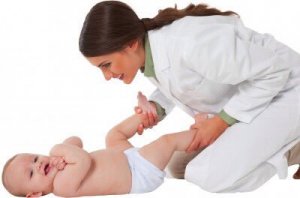One of the most harrowing experiences in a mother’s life is dealing with a gassy baby. A baby suffering from infant gas problems cries a lot, especially after feeding. As a result, she is usually cranky and fussy. My son suffered from gas in the initial months of his life. He would inconsolably cry, and it was challenging to soothe him and make him sleep. But gradually, I started researching the cause and home remedies to relieve a gassy baby.
After trying quite a few of them, I found that they work! So, in this post, I will share with the readers some simple home remedies for treating gas in babies and toddlers and gain insights on gas relief for kids. But before that, let us see what causes gas in babies and toddlers.
Causes:
- The leading cause of newborn infant gas problems or gas problems in a newborn is their small and underdeveloped stomach which sometimes doesn’t digest the feed properly, thereby causing gas.
- Another reason is that sometimes babies take in a lot of air during feeding. That, in turn, causes gas.
- Toddlers have more varied reasons for infant gas like eating certain foods that cause gas, maintaining poor hygiene, not taking enough fluids etc.
- If the baby is overfed it can lead to the gut of the baby producing gas.
- A baby may develop infant gas due to possessing an underdeveloped bacterial flora ( present in the intestine). It comes from harmless bacteria breaking down undigested sugars in the large intestine.
- Feeding babies too much fruit juice can also cause gas, as well as bloating, tummy pain, and diarrhoea.
- Excessive crying – Babies tend to swallow air when they cry, resulting in the gas build-up.
Symptoms:
Infants cry for various reasons, thus it might get difficult to understand why they are crying. It is better to be aware of the symptoms of infant gas so that you can help with remedies for gas relief for kids. Some of the infant gas symptoms are,
1. Hiccups And Burps:
It is common for newborn babies to have hiccups often. But if you notice your baby hiccups more than she usually does, it could be due to gas. Similarly, burps being normal in infants could be a symptom of gas if it happens more than the normal way. In my case, my son used to have hiccups right after feeding. And soon those turned into crying and discomfort.
2. Spitting Up:
Again, it is normal for babies to spit up some feed. But I noticed that whenever my son was cranky and spit upright after feeding, his stomach felt hard to touch. I knew that the culprit must be the gas.
3. Bloating:
If your child’s stomach feels hard to touch, it is most likely due to gas. A swollen abdomen is also a sign that your baby is suffering from gas.
4. Fussiness And Crying:
Needless to say, fussiness and crying are the first signs of discomfort for anyone. But when I tried to evacuate the fussiness in my son and all the other mentioned symptoms I was sure that he was suffering from gas.
5. Insomnia Or Restlessness:
If the baby is feeling any form of discomfort, it will make it difficult for the baby to sleep.
6. Flatulence:
It is normal for a baby to pass gas 15-20 times a day however excess gas can be a sign of incomplete digestion of food as they have an immature digestive system
Now that you know that your baby has gas let me share some popular home remedies to treat gas in babies and toddlers. These tips are easy to follow and will relieve a gassy baby in no time.
7. Pulling up legs:
Pulling up legs is a common behaviour seen in babies and toddlers who are experiencing gas discomfort. This behaviour involves the baby or toddler pulling their legs up for infant gas relief and getting rid of discomfort in their belly.
Pulling up the legs can be an effective way to relieve gas in a baby because it helps to stretch the muscles in the abdomen and promote the passage of gas. This behaviour is often accompanied by other symptoms of gas, such as fussiness, crying, and flatulence.
8. Arching back:
Arching the back is another sign your baby has gas. This behaviour involves the baby or toddler arching their back and pushing away from their caregiver or parent.
Arching the back is thought to be a way for babies and toddlers to help a newborn with gas and distress in their stomach by stretching their abdominal muscles.
9. Refusal to eat:
Gas can cause discomfort and pain in the abdomen, which can lead to a loss of appetite and refusal to eat. These symptoms can make it difficult for them to focus on feeding and cause them to refuse food or drink.
If your baby or toddler is experiencing refusal to eat, it is important to monitor their hydration status and ensure that they are getting enough fluids. Offering smaller, more frequent feedings may also be helpful, as it can be easier for babies and toddlers to tolerate smaller amounts of food at a time. Another common baby’s gas relief symptom is seen in a lot of them.
10. Sleep disturbance:
Gas discomfort can also cause sleep disturbances in babies and toddlers. When babies and toddlers experience gas pain, it can be difficult for them to settle down and fall asleep. They may wake up frequently during the night or have trouble falling back asleep. Sleep disturbances caused by gas discomfort can be a challenge for parents and caregivers, as they can lead to exhaustion and frustration.
Home Remedies To Treat Gas In Babies And Toddlers
1. Right Position While Feeding:
Improper positioning of your baby while nursing often makes the baby swallow air along with milk.
- Always feed the baby in an inclined position.
- If you are feeding your little one with a bottle, while feeding makes sure there is no air in the nipple.
Note: Try to avoid nursing while lying on the bed.
You may be interested in reading – Positions and Tips for making Breastfeeding easy

2. Burping After Every Feed:
Babies often swallow some air while feeding even if we take every precaution. So, it’s important to burp them properly after every feed. This is one of the most effective Home Remedies to Treat Gas in Babies and Toddlers and relieve a gassy baby.
- Gently place your baby on your shoulder and pat her back for five minutes. Doing this usually eliminates gas swallowed while feeding.
- For babies who can sit on their own, allow them to sit down after feeding. Additionally, you can pay them back gently to eliminate any residual air.

3. Massage:
If you find your baby cranky or crying even after burping:
- Try massaging her stomach gently in a clockwise motion for some time.
- You can also use a little mustard oil massage. Mustard oil has a surprisingly good effect in calming down a gassy baby.
You may be interested in reading – New Moms Guide To Baby Massage

4. Bicycling:
This is considered a great exercise for babies and keeps the baby active and playful as well.
- Bicycling is done by gently moving your baby’s legs just like cycling.
- While moving make sure his thighs touch his stomach.
5. Tummy time:
I discovered the importance of tummy time when my son was two months old. As I have already mentioned, my son, as an infant, suffered from gas. I tried most of the above techniques to relieve his uneasiness. Most of the time I was successful but when I learned about tummy time and started practising with my son I observed that he rarely cried because of gas. It is best to give tummy time to your baby two or three times a day.
- Place your little one on his tummy and let her stay in that position for one or two minutes depending on how long she can stay in that position.
- Gradually increase the time as your baby gets comfortable.
Tummy time is not only good for relieving gas but also for strengthening your baby’s neck and back.

6. Cumin Seeds (Jeera):
Cumin seeds (Jeera) are best known for their digestive properties and are one of the best Indian home remedies for gas problems in infants. Simple cumin water can relieve a gassy baby.
- Heat approximately a glass of water with a teaspoon of cumin seeds.
- Give this concoction to your baby every few hours.
Preferred Age: For babies above six months of age.
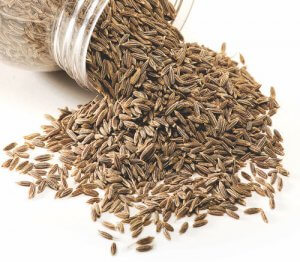
7. Asafoetida (Hing):
Hing aids in the digestive process by releasing digestive enzymes in the stomach. So, hing for baby gas troubles would be an effective home remedy. You need to use it as directed according to the baby’s age.
For Infants: Make a paste by taking Asafoetida (a pinch of it) with warm water. To relieve a gassy baby apply this hing paste around his navel. This is considered one of the best home remedies to treat gas in infants.
For toddlers above one year of age: Add a pinch of Asafoetida or hing in baby food (like khichdi, Pongal). This works well in preventing the gas formation and provides gas relief for kids.
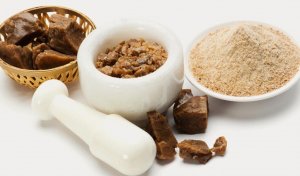
8. Ginger (Adrak):
Ginger in food helps stimulate saliva, bile and gastric juice production to assist in digestion. Add a pinch of ginger in your baby’s food.
Preferred Age: For babies above 8 months of age.
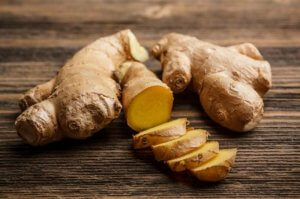
9. Carom Seed Water (Ajwain ka Pani):
- Heat approximately a glass of water with a handful of carom seeds.
- Give this concoction to your baby at frequent intervals.
Preferred Age: For babies of 6 months and above.
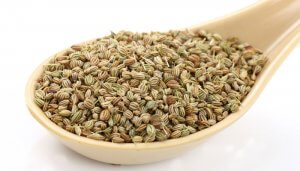
10. Warm Compress:
- Soak a cotton towel in warm water and squeeze out excess water.
- Place it on the baby’s tummy. Do check that the towel is not so hot for a baby.
- Repeat after frequent intervals.
A word of caution: Don’t use hot water bottles on the baby’s tummy.
 11. Identify And Eliminate The Triggers:
11. Identify And Eliminate The Triggers:
Many food items such as high-sugar fruits, legumes, and aerated drinks trigger the formation of gas. Carefully observe your child’s eating pattern and identify the food that causes gas. It is best to avoid such items that are known to cause gas in your child.
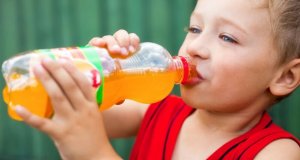
12. Lots Of Fluids:
As a rule of thumb, one should take plenty of water to digest the food we eat. Children often forget to drink sufficient water.
- Be vigilant and make your child drink plenty of water.
- Along with that, you can supplement it with other fluids like coconut water, fresh lime juice, lassi, etc.
Preferred Age: For babies of 6 months and above.

13. Maintaining Hygiene:
Toddlers and preschoolers often spend a lot of time playing. And often unknown microbes enter your child’s body through eating without washing hands. This can be a reason for gas and stomach ache. Teach your child to wash hands thoroughly before eating and after using the restroom.

These home remedies to treat gas in babies and toddlers not only provide relief to the baby’s suffering but also do not have any other side effects.
14. Slowing Down Feeding
Slowing down the rate at which formula-fed babies eat. Some babies drink bottles of milk very quickly, causing them to swallow air. Try using a slow-flow nipple and feed them slowly.
15. Testing New Formulas
Changing formulas is important to know what best suits your baby. formulas are marketed to reduce gassiness in babies.
16. Lime Bud Tea
Often people ask if is lime good for babies. Lime is a good component when it comes to improving digestion and decreasing gas levels. Lime is a natural detoxifier and thus aids one’s digestive system. Lime bud gripe in babies is yet another remedy good for gassy issues. But you might wonder – is lime bud tea good for babies? If given in moderation, lime bud tea can help with stomach-related issues. Lime bud for babies should be given to infants who are older than 6 months at least. Lime water for babies is a safe ingredient. Lime buds for gripe water can also be used. You can use a lime leaf tea for babies if you want to substitute gripe water.
17. Make a Tulsi Leaves Concoction
The leaves of tulsi (basil) contain antispasmodic effects. As a result, they can assist your infant in dealing with gastrointestinal issues. Bring a pot of water to a boil with a few basil leaves. Offer it to your infant to drink after it has cooled down.
18. Peppermint is a good choice
Peppermint contains antispasmodic and relaxing effects. Warm-up a teaspoon of baby massage oil by rubbing a little of the oil in your palms. Then gently rub the oil into the baby’s belly.
These are a few effective ways to relieve gas in toddlers. However, you should consult your paediatrician if you have any qualms about using these remedies or in what proportion should you give them to your toddler.
Do you have any more tips or home remedies to treat gas in babies and toddlers or relieve a gassy baby? Do share with us in the comments below. Please share the gas relief for 3-year-old home remedies.
How To Prevent Gas Problems In Kids?
To prevent gas problems in kids make sure your baby or toddler is active as the GI tract functions better when there is regular cardio activity, avoid carbonated drinks or chewing gums for the baby as it leads to kids taking more air than usual leading to gas.
When To Visit The Pediatrician Or Seek Medical Care?
Paediatrician is required if:
1. The baby or toddler is having constipation
2. The baby is inactive or cranky
3. There is disturbed sleep or loss of appetite
4. They develop mild or severe fever
How Often Should You Make Your Baby Burp To Prevent Gas?
- Many babies will burp midway during and after a meal to get rid of any air bubbles. Burping your baby at typical feeding pauses, such as when he settles down after completing the first breast, is a good idea. While some newborns require more regular burping, many parents make the error of interrupting feedings with unneeded burping attempts. This increases air swallowing by lengthening the feeding period and aggravating a hungry infant.
Is It Possible To Relieve Your Baby’s Gas Pain?
Feeding her before she screams, a warning that she’s too hungry to wait much longer can help avoid gas. Once you do feed her, take your time because fast feeding causes her to take in more air. If your milk is coming down quickly while you’re nursing, you may need to separate your baby for a time to let the milk spray calm down so she can control the flow. If you’re bottle-feeding, make sure the nipple aperture isn’t too big or too tiny. When a baby is bottle-fed, they tend to swallow more air, especially if the nipple of the bottle isn’t full of milk. Follow the tips mentioned above to relieve a gassy baby.
Disclaimer: These home remedies to treat gas in babies and toddlers that I have mentioned in this article of mine are my own tested and tried on my son. In case of any unfortunate effect or side effect, and if the situation worsens, you may please consult your paediatrician for gas relief for kids.
FAQ
Can Breastfeeding Lead To Gas In Babies?
If the baby is fed breast milk, lactose overdose or too much air consumption while being breastfed can lead to gas problems in babies or irritability as well. But unless you can pinpoint gas to be the culprit behind your cranky child, you cannot use home remedies to treat gas in babies and toddlers. The next question is how do you know that your baby is suffering from gas? Let us examine some of the symptoms.
How can I naturally relieve my baby’s gas?
You need some home remedies for newborn gas problems. The first and foremost remedy you can use is feeding your baby in the correct position. Ensure that you place it in an inclined position and that there’s no air in the nipple of the bottle you use to feed it. Another newborn baby gas problem home remedy is burping your baby after every meal. Place your baby on one shoulder, and pat its back for some time. This will eliminate any gas that it took in while feeding. You can also massage your baby’s stomach in a clockwise movement to eliminate gas. Uses some mustard oil since it disseminates the air.
Another exercise is bicycling and placing it on its stomach. This helps your baby get used to this position and strengthens its back and neck in addition to eliminating gas. Lastly, you can also use lime bud tea for babies with gas since it improves digestion and decreases gas. Infants over six months of age can consume lime bud tea.
What causes toddlers’ painful gas?
Gas problems in toddlers are a common occurrence. One of the primary causes is their underdeveloped stomach. They can’t digest the milk completely which leads to gas. Another reason can be that they suck in a lot of air when they feed. Similarly, they also take in a lot of air when they cry and get gas.
Certain kinds of food, poor oral hygiene, and less intake of fluids also cause gas. If the baby intakes a lot of juice, it experiences gas, bloating, diarrhoea, and stomach aches too. Additionally, if a baby is overfed, its gut produces gas. Toddlers’ intestines might have underdeveloped bacterial accumulation. Harmless bacteria break down undigested sugars and this causes the growth of bacterial fauna in the large intestine. This leads to gas.
How do I know if my baby is suffering from gas?
Some of the main symptoms of a baby suffering from gas include too many burps and hiccups. If your baby spits up feeds often and then gets cranky, feel its stomach. If it’s hard, then it must be gas. If you notice your baby’s stomach getting hard and unusually bloating then it’s a sign too.
Some other symptoms include restlessness, discomfort, and insomnia. Like any adult, babies get uncomfortable sleeping with accumulated gas and stomach aches too. Gas also causes crying and fussiness. Lastly, if your baby passes excessive gas, then it’s because of incomplete digestion.
What are the signs of a gassy baby?
Some of the signs of infant gas are bloating, flatulence and constant crying or fussiness. Babies feel uneasy and uncomfortable when they are having a gas problem. Infants can also spit up milk if they are feeling gassy. Lime water for babies is a good remedy for gas relief for kids. Try the mentioned home remedies to relieve a gassy baby.
How long does baby gas last?
Most infant gas problems arise due to swallowing air while taking their feed. This problem can start within a week or two in a baby’s life. While most infants grow out of this gas problem by around four to six months of age, sometimes it can last longer. Try home remedies to relieve a gassy baby when they are feeling uncomfortable due to gas. These home remedies like lime water for babies or hing (asafoetida) water are effective in gas relief for kids. You can also try giving tummy time to the baby or practise cycling motions to relieve a gassy baby.
When should you worry about infant gas?
Infant gas is a common problem with many babies. Sometimes it goes away on its own after burping the baby after a feed. However, you should worry about infant gas if your baby is constantly fussing or crying because of this discomfort. If the issue doesn’t subside or the baby is constipated or cranky you should visit a paediatrician.
Which position is best to relieve gas in babies?
Laying the baby on their back and gently moving their legs in a bicycling motion can help relieve gas.
You may be interested in reading:
- Home Remedies For Dry Cough In Babies And Toddlers
- Baby Boy Names 2022
- Baby Skin Problems –
- Best prams for babies in India
Happy Positive Parenting
- Home Remedies To Treat Gas In Babies And Toddlers - March 13, 2022
- Home Remedies For Dry Cough In Babies And Toddlers - March 1, 2021
- A HOME IS NO HOME WITHOUT MOM - November 19, 2018
- How To Get Pregnant Fast - January 8, 2018
- 8 Secrets Of A Happy Mother - October 5, 2017
- How Safe Are Caffeinated Drinks Like Coffee/Tea During Pregnancy - June 26, 2017
- Things I Learned From My Postpartum Depression - June 7, 2017
- Rookie Moms Guide To Baby Massage - May 31, 2017
- Words of advice to Young Ladies from a Not so Young Lady - May 29, 2017
- Little Things Moms Miss Every Day… - May 8, 2017





